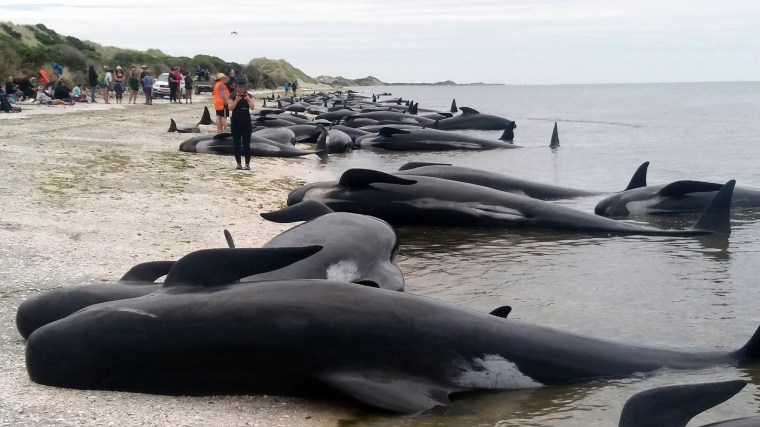Hundreds of volunteers formed a human chain in the shallows of a remote beach in New Zealand as they tried desperately to save hundreds of pilot whales that have beached themselves there.
About three-quarters of the whales had already died by the time they were discovered Friday morning at a place called Farewell Spit on South Island. The incident is being called one of the worst whale beachings in New Zealand's history.
An official from New Zealand's Department of Conservation said about 300 volunteers had joined conservation workers on the beach. She said rescuers had re-floated the whales at high tide and had formed the human chain to try to prevent them swimming back ashore.
Earlier, as they waited for the tide to come in, volunteers had tried to keep the whales damp and cool by covering them with blankets and dousing them with buckets of water.
Volunteer rescue group Project Jonah said 416 whales were stranded, and 75 percent of them had died by the time they were discovered. The Department of Conservation put the number of dead whales at 250 to 300.
The high tide gave volunteers their only chance of the day to help the whales.
PHOTOS: Volunteers Race to Save Whales
Should the whales become stranded again, volunteers will have to wait until the next daylight high tide, which will come Saturday.
The Department of Conservation official said whale strandings occur most years at Farewell Spit, but the scale of this stranding had come as a shock. She said farmers and other locals were helping out and people were also arriving from other parts of the country.
Experts have different theories as to why whales beach themselves, from chasing prey too far inshore to trying to protect a sick member of the group.
Farewell Spit is sometimes described as a whale trap. It has a long protruding coastline and gently sloping beaches that appear to be difficult for whales to swim away from once they get close.
Conservation workers said many of the surviving whales were probably in bad shape and their condition would likely deteriorate.
